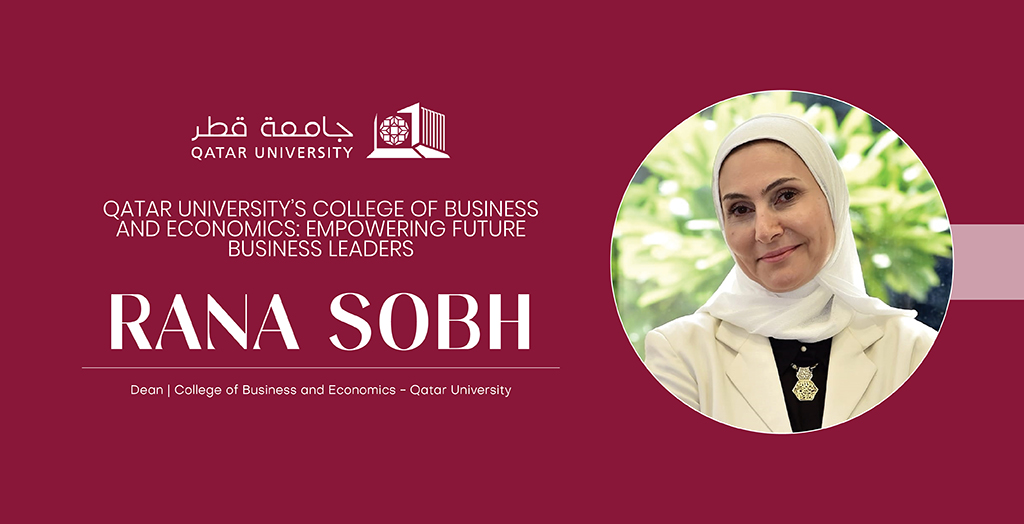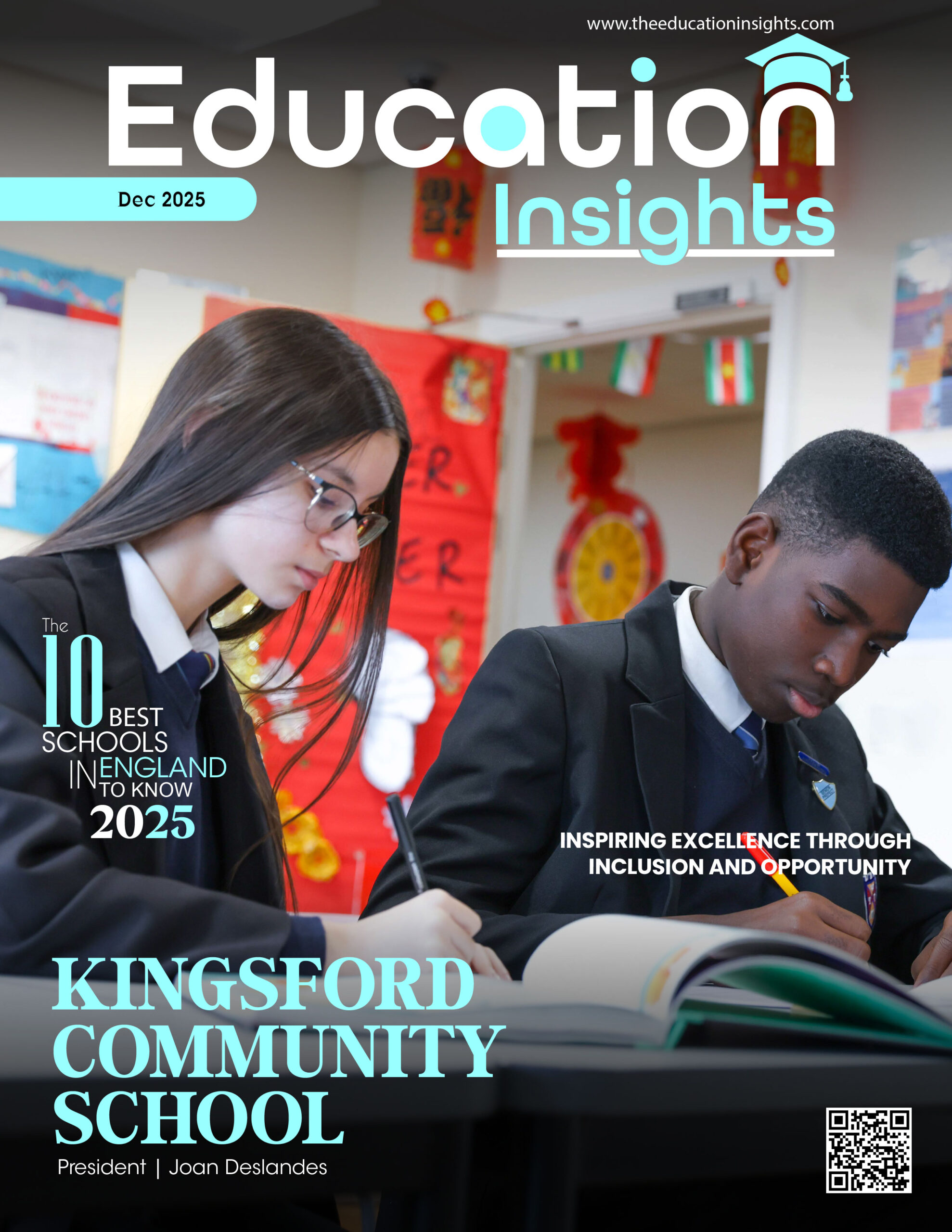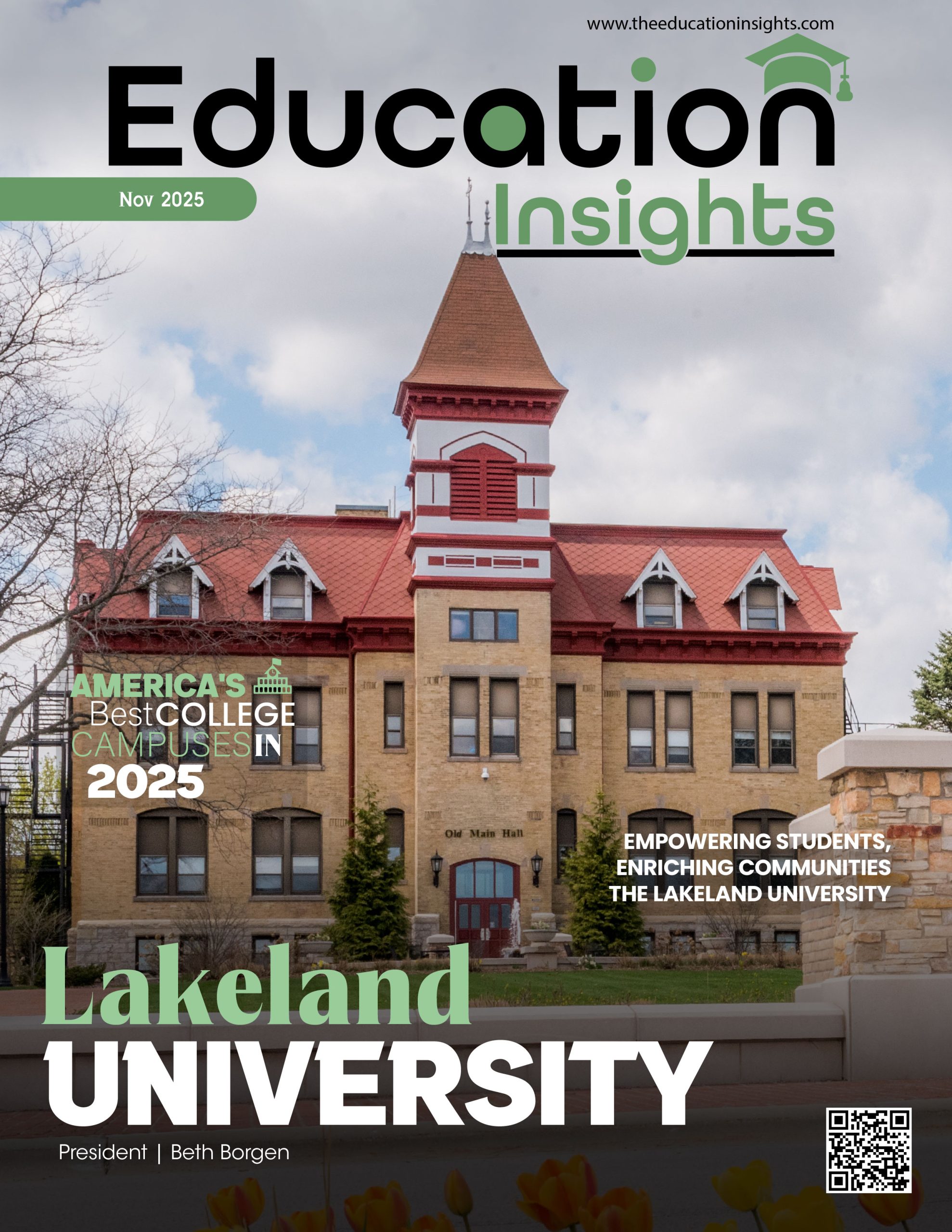Established in 1985, Qatar University’s College of Business and Economics (CBE) stands at the forefront of business education. It offers diverse graduate and undergraduate programs to empower students for successful careers in a rapidly changing global economy.
Prof. Rana Sobh: A Visionary Educator
Prof. Rana Sobh is the Dean of the College of Business and Economics (CBE) and a Professor of Marketing. She earned her PhD in Marketing from the University of Auckland in New Zealand. She joined Qatar University in 2007 and has accumulated over seventeen years of academic leadership experience. Prof. Rana’s journey is defined by her strong commitment to innovation, collaboration, and transformative education.
She belives business education is not just about transferring knowledge —it is about building bridges to the future and empowering the next generation of leaders to create meaningful impact in an ever-changing world.
The Key Inspiration: Career in Business Education
Prof. Rana’s decision to pursue a Bachelor’s degree in Business Administration was somewhat coincidental, as she did not particularly enjoy business studies at the time. However, as she progressed in her academic journey, she discovered a genuine interest in studying consumer behavior and psychology during her PhD studies.
Over time, Prof. Rana realized that her true passion was in business education, where she could merge her academic interests with a deeper purpose. She became an advocate for responsible business education. The ability to empower the next generation of leaders and witness their meaningful contribution to their communities has inspired her to pursue and remain in this rewarding academic career.
Adapting to Evolving Global Business Trends
CBE is at the forefront of adapting to global business trends through innovation, strategic industry partnerships, and curriculum enhancements. The institution has introduced an Emerging Business Technologies Hub to integrate AI and digital tools into learning. It continuously revises its programs to ensure alignment with the evolving job market. For example, CBE has launched a Master’s in Business Analytics to meet the increasing demand for data-driven decision-making skills.
Essential Skills for Business Students
In this fast-paced business environment, students should develop a combination of technical, digital, and soft skills. Key abilities include critical thinking, problem-solving, and adaptability. Additionally, technology proficiency, particularly in areas like AI, analytics, and digital tools, is essential. Students should also focus on ethical leadership, sustainability awareness, and the ability to collaborate across cultures, as these skills are important differentiators in a global workforce.
Ensuring the Curriculum Aligns with Real-world Industry Needs
CBE maintains a strong connection with industry leaders to ensure its curriculum remains relevant. This is achieved through advisory boards, collaborations between faculty and industry, and hands-on learning opportunities such as case studies, business boot camps, and executive education programs. The incorporation of AI, fintech, and sustainability into its curriculum reflects the needs of today’s business landscape.
An Edge Over the Peers
CBE is dedicated to pushing boundaries and setting the stage for a business education that fosters skilled, responsible, and resilient graduates. The institution understands the importance of moving beyond traditional paradigms and adopting a holistic approach to meet the evolving expectations of the business world. Its focus extends beyond the classroom to maximize its societal impact at local, regional, and global levels.
Major Strategic Goals for the Next Five Years
The College of Business and Economics is committed to developing educational programs that are agile, responsive to job market dynamics, and aligned with societal needs. The institution will also focus on creating more opportunities for experiential and high-impact learning through internships, projects, local case studies, and real-world simulations. Furthermore, it will build robust connections with community and business leaders to provide students with valuable insights, mentorship, and networking opportunities.
Contributing to Qatar’s National Vision 2030
CBE plays a crucial role in developing human capital, fostering innovation, and promoting sustainability, which are core pillars of Qatar National Vision 2030. By producing competent and socially responsible graduates, the institution significantly contributes to Qatar’s long-term development. This ensures that future business leaders and professionals are equipped with the knowledge, skills, and ethical foundation to drive progress.
Impact of Industry Partnerships on Education
Industry partnerships effectively connect academia with practical experience, offering students invaluable hands-on learning opportunities. One of the most significant aspects of this collaboration is the mandatory internship course at the CBE, where all the students spend two months working with a company or institution. Additionally, the institution frequently invites industry leaders as guest speakers, providing students with direct insights into current business practices, emerging trends, and leadership experience.
Integrating AI and Emerging Technologies
CBE is proactively integrating AI and emerging technologies into its curriculum. A central initiative in this effort is the Emerging Business Technologies Hub, which has recently been established to enhance students’ technological proficiency and ability to leverage AI tools effectively in their careers. The hub provides hands-on learning experiences, promotes collaborations, and offers specialized training in cutting-edge business technologies, preparing students to thrive in technology-driven workplaces.
The Impact of Digital Transformation on Teaching Methods
Digital transformation has affected teaching methods significantly. CBE employs AI-powered tools, hybrid learning models, and flipped classrooms for better engagement. Furthermore, the faculty’s research in technology-enhanced learning has guided the integration of lecture capture technologies and real-time business simulations, leading to improved student outcomes.
Supporting Leadership and Professional Development
CBE is dedicated to fostering student leadership and professional development through numerous initiatives. The colleges offer structured leadership development programs, including mentorship opportunities, where students receive guidance from experienced faculty and industry professionals. These mentorship opportunities help students refine their career goals, enhance their leadership skills, and gain valuable insights from accomplished professionals.
Opportunities for Engaging with Real-world Business Challenges
CBE provides students with numerous opportunities to engage with real-world business challenges. Students actively participate in consulting projects, where they work directly with companies to analyze business problems and propose strategic solutions. These hands-on experiences allow students to apply their classroom knowledge in practical settings while developing valuable industry-relevant skills. CBE also hosts business hackathons and startup incubators, encouraging students to think creatively and develop innovative business solutions. Through these initiatives, students collaborate with peers, mentors, and industry experts to design and refine business models, preparing them to become future entrepreneurs and business leaders.
Evolution in Business Education – In the Next Decade
Over the next decade, business education will undergo a significant transformation. It will become more personalized, technology-driven, and interdisciplinary. AI and digital learning platforms will revolutionize education by providing customized, adaptive learning experiences tailored to students’ needs. Experiential and competency-based education models are likely to become the standard, ensuring that students not only acquire theoretical knowledge but also develop practical skills necessary to navigate the complexities of the modern business world.
Major Challenges in Higher Education
One of the most pressing challenges is keeping pace with changes in various industries while maintaining academic rigor. As industries undergo rapid transformations driven by technological advancements, universities must continuously update their curriculum to ensure graduates possess the relevant skills. Although AI and emerging technologies present new opportunities for personalized learning, data-driven decision-making, and enhanced research capabilities, universities should develop effective strategies to incorporate these tools into their teaching and learning processes.
The Roadmap: Over the Next 10 Years
Over the next 5-10 years, CBE will continue to stand at the forefront of education, sustainability, and digital innovation, driving impactful change in the region and beyond. As the global higher education landscape evolves, Prof. Rana and her team are committed to becoming more accessible, agile, and flexible—these are the key factors for success that will shape the future of higher education. CBE will prioritize the expansion of its program portfolio while continuously enhancing its existing programs to remain competitive and relevant.










